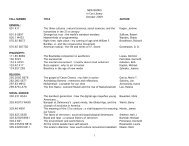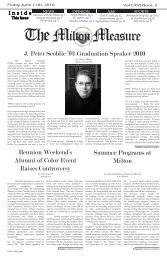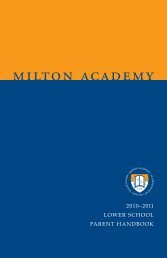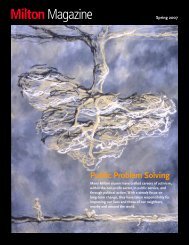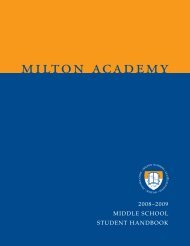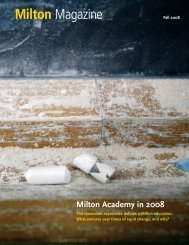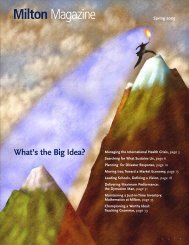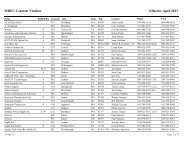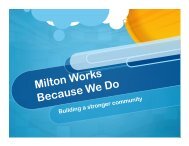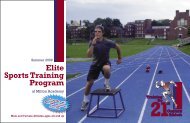“The biggest change is corporateinterests. Editors do not havethe same sense of autonomy.Budgets are being cut. Withfewer reporters, newspapershave less manpower to followleads.”“Actually, I work for a newspaper, but peoplewon’t talk to me without it.”that reporting, in and of itself, makes hermore objective: “Over time you see thateveryone is playing games on some level.As a result, I have become more and moreapolitical as I’ve gone along.”Cynthia does recognize that print journalismhas lost some of its power and reach.“The biggest change is corporate interests.Editors do not have the same sense ofautonomy. Budgets are being cut. Withfewer reporters, newspapers have lessmanpower to follow leads. Old-timersused to be able to pursue documentdriven,long-term stories everywhere. Thebiggest pieces could have teams workingfor years. Those sorts of stories representthe free, vigorous press we like to talkabout.” This immersion process, this freedomto take the time needed to tell thewhole story, leads to “good, powerful stories,”the lifeblood of print journalism.Budget cuts are only part of the story.Caught, herself, on the generational cuspbetween print and Internet new sources,Cynthia sees the need to appeal to peoplewho use both. “It is so frustrating to see aReader’s Digest of the news; you can’t boxstories that way. At the same time we [inCynthia Needham ’95print] have to convince people to come upwith the time, a day after an event, to readthe whole article, the full, in-depth version.In the corporate sense, I don’t knowthe answer to the dilemma.”Web sites ultimately have to support andcomplement the print news coverage,Cynthia thinks. Recently the Journal hasrun online surveys soliciting input fromAbout his beat: Fred Melo ’94 in St. Paul MinnesotaFred Melo ’94 is a beat reporter for theSt. Paul Pioneer Press in St. Paul,Minnesota. He covers the suburbancommunity of Dakota County, south ofthe city. “Some of this work is in myblood, “ he says. My father was areporter in the Dominican Republic andalso worked for a small weekly newspaperoutside of Boston, so I grew updrowning in stacks of newspapers. I’vealways enjoyed learning and storytelling…sothis industry allows me toopen a lot of doors and peek into manyrooms and experiences without gettingstuck in any particular one. Everyday,work is varied and forces me to turn ona dime. The deadline pressure gets myblood flowing, and writing is its ownreward. There’s also the gratification ofseeing your byline in print the next day.Sometimes, something you wrote actuallyhelps people.“People are nervous around reportersnow. I’ve had friends clam up aroundme in mid-conversation, worried theymay be revealing too much about theirworkplace.“We compete directly with the MinneapolisStar Tribune (the Strib), and your heartsinks when you see a piece in the Stribthat could have, should have been yoursfirst. I open the newspaper every morningwith a little bit of apprehension.“…My audience is an older, suburbancrowd, mostly property owners and peoplewith children. The growth of the suburbanaudience is increasingly trueacross the industry. Core readers are lesslikely to be city workers. Instead, theywork in suburban office parks and commutefrom suburb to suburb. Making ametropolitan newspaper relevant to sucha non-centralized audience is a tallorder.”Fred Melo ’9410 <strong>Milton</strong> Magazine
eaders about social issues under debate.By and large, the surveys work and JournalWeb editors have told Cynthia that theyare always surprised by the thoughtfulnessof the comments they receive. “Hearingfrom the extremes of our readers has beenfascinating. When people are charged upby a story, they love to post their feelingsand thoughts. Surveys may be a way toconnect readers.”For Cynthia, <strong>Milton</strong> was “a great steppingstonefor this kind of work because you’retrained to seek the full answer. Thereeverything is challenged; the overall environmentmakes you question everything.”John Charles Smith, she says, gave her alove of English and taught her how to askquestions that push the envelope. DebbieSimon was another significant influence.“Being thrown into an environment likethe speech tournaments, even though Iwasn’t a current events competitor, makesyou hyper-aware of current events and theworld at a time when most teenagers arenot ready to touch on those serious questions.When you leave, you realize how far<strong>Milton</strong> pushed you.” Cynthia learned totake nothing on faith but to believe thatthe fact, if found and respected, wouldreveal the true story.Rod Skinner ’72Director of College CounselingAbout his beat: David Colbert ’95 in Gardner, MassachusettsDavid reported for metropolitan Bostonweeklies, and edited a weekly paper,before reporting for the Gardner News, asmall daily serving Gardner, Massachusetts,and surrounding towns. Along theway he earned the 2003 New EnglandPress Association Award for SpecialFeatures.“I share Gardner coverage with oneother reporter,” David says. “My beatconsists primarily of crime and politics,but lucky for Gardner there isn’t enoughof either to occupy all my time, and Ihave to dig for other stories.“The frustration is that a beat reporter ata small paper doesn’t have time to domuch investigative journalism, or to reallywork a topic over. I do like how wellyou get to know the community in whichyou work. You find out its history, thenice neighborhood and the one on theother side of the tracks, what people dofor a living, which ethnic groups livewhere, everything that former politiciansmessed up. Every community, no matterhow simple on the surface, has fascinatingstories. Unfortunately, at a smalldaily, you don’t always get the chance totell them.“Gardner used to be the chair manufacturingcapital of the world, but is nowone of the poorest communities in thestate. Most of its factories have been torndown or stand empty. City officials aretrying to get the owners to tear themdown because they fear a major fire, andneighbors complain that teenagers andhomeless people break into them. Still,it’s a relatively safe and tight-knit community;many people are working toimprove it, and people are moving in tonew expensive houses. Tracking thecity’s changes would be nice—what pressuresto go in different directions. Itwould be great to find out why so manypeople in their teens and twenties areusing crack and heroin. Unfortunately,I’m usually limited to reporting on themayor’s initiatives or the latest drugbust.“Still, I always feel that I’m providing animportant service, that in an open societythere is news that someone has to report(accurately, free of the spin that somebodyalways wants you to add), no matterhow unglamorous. Beating the competitionto a big story (two other dailies coverthe city) is a thrill, but for me the bestpart is just talking to people. The mayor(a guy who kept a grinch doll namedafter the school superintendent hangingon a noose in his office) tells me hiswheeling and dealing. A city councilortells me about the French-speaking testyou used to have to take to join theAcadien Club. The deputy police chiefcomplains about the time he caught twokids, literally red-handed, after spraypaintingtheir names in a playground,only to have a judge nicknamed ‘Let ’emSlide’ dismiss the charges becausenobody witnessed the vandalism. An elderlywoman stops me in the courthouseto tell me about how some kids whoknocked over gravestones should be sentencedto cleaning floors with a toothbrush.“If I had to pick one story of which I ammost proud, it would be a feature I wroteon two Muslim families. I spent a daywith them talking about their customs,the differences between their homecountries and the United States, what itwas like to wear a veil after September11. One of the men told me he liked thearticle so much he sent it to his father inEgypt. That was flattering for me, personally,but also a chance to show theworld what a free press can do.”David Colbert ’9511 <strong>Milton</strong> Magazine
- Page 3 and 4: 283440Journalism at Milton24 Studen
- Page 6 and 7: One piece of AOL programming that h
- Page 8 and 9: puter) and read a piece. Bored? Pro
- Page 10 and 11: decrease in the amount spent on res
- Page 14 and 15: Jesse Sarles ’93“It’s a flexi
- Page 16 and 17: Felicia Taylor ’82Ned Roberts ’
- Page 18: “I don’t go through a lot of me
- Page 21 and 22: This summer, Peter was in the midst
- Page 23 and 24: Ty Burr ’76“On one level what I
- Page 25 and 26: Later, she enjoyed stints at Workin
- Page 27 and 28: were what to get into at Milton. Ma
- Page 29 and 30: Charlie Riggs, Abby Padien-Havens,
- Page 31 and 32: They say that the tough part was th
- Page 33 and 34: Co-editors of La Voz, 2005:Emma San
- Page 35 and 36: In its three to four annual issues,
- Page 37 and 38: 6 Sam Minkoff ’06 andJamal Sabky
- Page 39 and 40: Student graduation speakers Tanner
- Page 41 and 42: The Robert L. Daley PrizeCreated by
- Page 43 and 44: 1 Llewellyn Howland ’552 Derick F
- Page 45 and 46: 11 Robin Robertson with the MiltonM
- Page 47 and 48: The Head of SchoolMilton’s Magazi
- Page 49 and 50: I began to inventory the sensations
- Page 51 and 52: Hadley Davis Rierson ’89speaking
- Page 53 and 54: Emmy Norris is a prowler for “cul
- Page 55 and 56: A collection of symbols, none more
- Page 57 and 58: Middle School Tackles Complex Probl
- Page 59 and 60: Gratwick Performersdents prior to t
- Page 61 and 62: He changed his mind, though,soon mo
- Page 63 and 64:
Creating Cityscapes:Third-grade stu
- Page 65 and 66:
New Roles for Milton Faculty Member
- Page 67 and 68:
Hugh R. SilbaughUpper School Princi
- Page 69 and 70:
Academy. Jorge was singularlyfocuse
- Page 71 and 72:
There are many variations foreach s
- Page 73 and 74:
Class of 1950, front row (left to r
- Page 75 and 76:
Class of 1955, front row (left to r
- Page 77 and 78:
Class of 1980, holding banner (left
- Page 79 and 80:
Class of 1990, front row (left to r
- Page 81 and 82:
Class of 1995, front row (left to r
- Page 83 and 84:
Margaret Creighton WilliamsMargaret
- Page 85 and 86:
The Lexi Rudnitsky Poetry Projectsp
- Page 87 and 88:
Milton AcademyBoard of Trustees, 20



